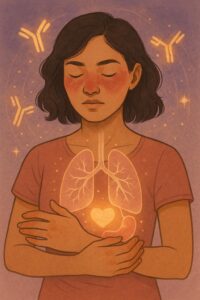Lupus (Systemic lupus erythematosus or SLE) is a chronic autoimmune disease where the body’s immune system mistakenly attacks its own tissues—including the skin, joints, kidneys, heart, lungs, and brain. Lupus can affect almost any part of the body, making it one of the most complex autoimmune diseases.
SLE causes inflammation, pain, and damage. It comes in flares (active periods) and remission (quiet periods), and no two cases are exactly alike.

